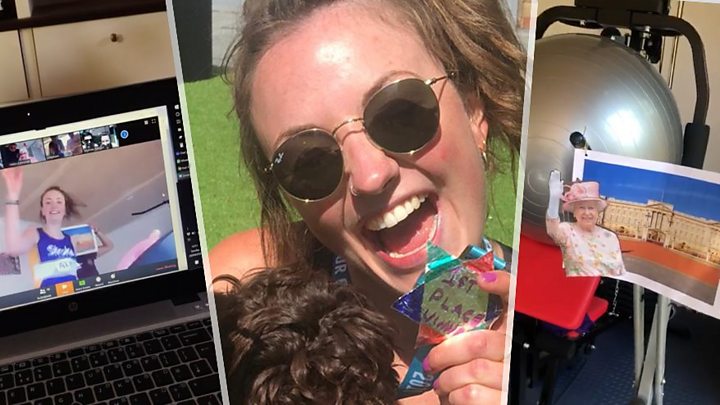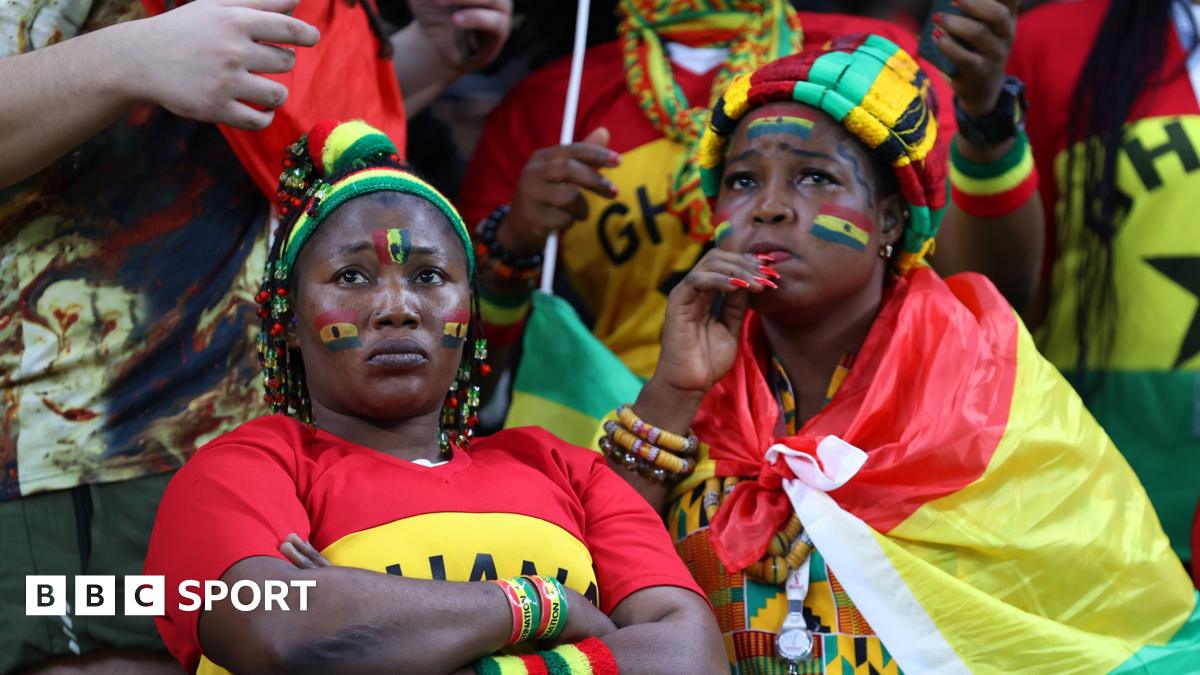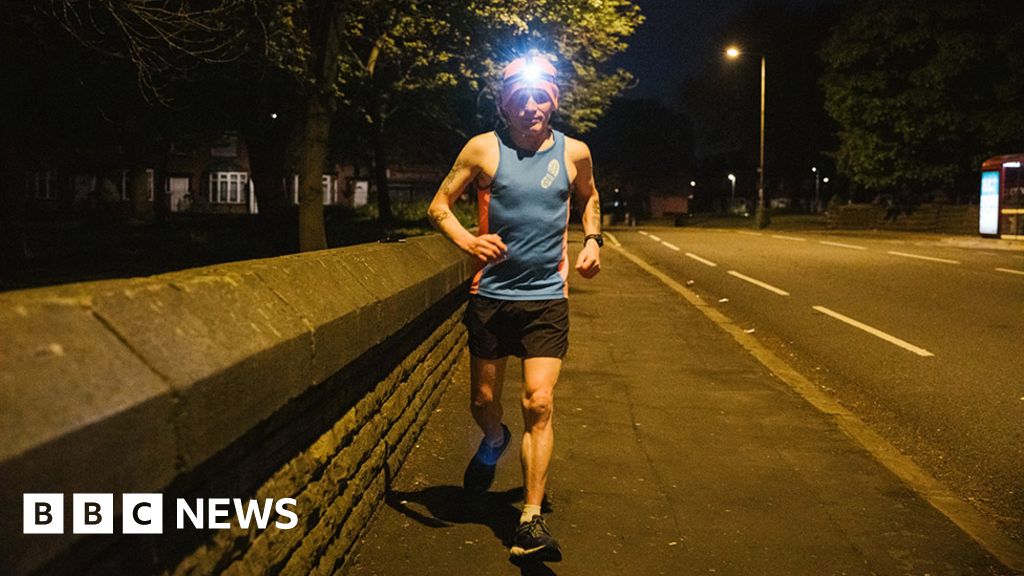Image copyright
Joanne Crawford
Colin Johnstone runs every night – racking up more than 100 miles a week
Lockdown guidance on exercising for people in England will loosen on Wednesday. But Colin Johnstone is among those runners who have not allowed their strict exercise regimes to slip, even if it means going out in the middle of the night.
At 02:00, Colin’s phone alarm clock rings out to mark the start of his day.
The 46-year-old warehouse worker slips into a pair of shorts, a vest, and a bright orange beanie, and grabs his head torch from the dining room table. He wolfs down a slice of toast and a bowl of porridge, before sharing a Snickers bar with his twin Keith, who he lives with. The brothers pull on their trainers – and then run a marathon on the quiet, locked-down, streets of south Leeds.
“Running in the middle of the night, it’s not ideal,” Colin says over the phone, after covering 26.2 miles (42.2km) at night for the fourth time in a month.
But he agrees the coronavirus pandemic is “not ideal” either. He takes social distancing “really seriously” and night-time pavement-pounding during lockdown is, he says, “the easiest way to do it”.
Image copyright
Joanne Crawford
“I’m never happier than when I’m running,” Colin says
Since 23 March, when Prime Minister Boris Johnson announced restrictions on our daily lives to tackle the virus, the brothers noticed how difficult it was to keep the proscribed 2m away from other people out for walks and runs.
Colin’s sessions started earlier and earlier as he tried to avoid the throngs of people exercising before starting work. For the past few weeks, he has been going to bed at 19:00 in order to go out running at about 03:00.
“Most people think I’m crackers,” says Colin, who covers more than 15 miles per run on average. But Keith, his regular training partner, agreed to the dramatic departure from their normal schedule. “Running sets me up on a morning – it’s the perfect way to start the day,” Keith says.
Image copyright
Joanne Crawford
Colin says running at night is safer than in the day – when his usual routes are “rammed” with people
The twins wear bright clothes and carry torches and mobile phones to help them stay safe – but some say their night-time outings are pushing the rules.
The guidance on exercise, in England, is set to change on Wednesday, having done so already in Scotland and Wales. Until then, it remains that people should only leave their home for one form of exercise a day.
How long can each session be? Shortly after lockdown began, cabinet member Michael Gove said a 30-minute run would be appropriate for most people, but that “it depends on each individual’s fitness”.
What is acceptable?
Gemma Lee, an associate at Gepp solicitors in Essex, says a “level of detail has been missing” in the guidance, thus far. But “anyone exercising for three or four hours is pushing it to the absolute maximum”. She adds that the changes in guidance mean people like Colin and Keith can now run as much as they like.
The twins are adamant that night-time running allows them to avoid social contact more successfully than if they ran shorter runs during the day. “I know that both me and Col are decent people and have done nothing wrong,” Keith says.
Image copyright
Colin Johnstone
Twins Colin (left) and Keith have run dozens of marathons since taking up running five years ago
“I try to go somewhere quiet, I do a bit along the canal, a bit round the streets,” Colin says after finishing his most recent three-and-a-half hour marathon. “But if I did that same route in the day, it would be absolutely rammed. So the way that I’m doing it, that’s perfect.”
“If they changed the laws and they said you have to completely stop, it would break my heart but obviously I’d do it,” he adds.
‘I miss the banter’
The daily time limits suggested by Mr Gove have been interpreted by some runners as allowing for longer runs. Martin from Brentwood, Essex, who is training for the London Marathon, which has been postponed until October, says: “I try to think of the week as a seven-hour total allowance and stay in on rest days to make sure that I stay within the government guidance.”
The 34-year-old director of an engineering company says he enjoys elements of running during lockdown. “You often get a nod, ‘thank you’ [or] ‘hello’ as each of you make adjustments to keep a distance. There is definitely a greater sense of community,” he says. But he misses his local training group.
While group members stay in touch via WhatsApp and the fitness tracker site, Strava, Martin says he does miss “the banter and competitive edge of training with others”.
Martin says training in rural Essex means he rarely gets within 10m of anyone – while Joseph sometimes runs as early as 04:00
Joseph Osakue from Newham, east London, ran a marathon on 4 April to coincide with the day he would have been taking part in the Paris Marathon, and has continued to run about 40 miles (64km) per week throughout lockdown.
The 48-year-old London Underground driver says he has been “very lucky” as social distancing guidance has not impacted his training “at all”. “I work around 9 to 5 every day. So I’ve always run at 6am and sometimes even 4am, depending on the distance,” he says.
Pavement pounding vs treadmill torment
Alice Jeffries, 25, says a “very good” coincidence meant she and her boyfriend, Ryan Blackburn, had bought a treadmill for their home in Waterlooville, Hampshire, just days before the lockdown began. On the day she should have been running the London Marathon, Alice ran the 26.2 miles on her treadmill instead.

Media playback is unsupported on your device
Alice, who works for a construction company but has been furloughed due to the epidemic, says running a marathon on roads would have been easier. “The change of scenery keeps you going so, as hard as it is, you’ve got something new to look at. Whereas on the treadmill… it seems like forever,” she says.
While the treadmill feels softer on her joints, “mentally it’s so much harder because you’re just in the same place”.
Benefits ‘outweigh risks’
Image copyright
Antony Harvey
Dr Jess Harvey, pictured at the 2016 Triathlon World Championships in Mexico, says leaving the house is important for maintaining good mental health
Dr Jess Harvey says people should take the opportunity to leave the house every day, even if they are able to exercise at home.
The Shropshire GP, who has competed in international triathlon events, uses an indoor bike to keep fit at home but says: “I’ll still go out for a walk or something even though I’ve had my exercise, because actually leaving your house is so important right now.”
For those who are using lockdown to increase fitness, Dr Harvey stresses the importance of nutrition to support the immune system and help the body to cope with the stress of exercise.
She adds that people must make an “individual assessment of risk” when leaving the house, but adds: “Actually the benefits of going outside to exercise vastly outweigh the risks.”
Alice says she would not have considered running the marathon away from home, due to guidance to minimise time spent in public places. She adds she would not follow Colin and Keith’s early morning schedule, either.
“I wouldn’t be able to get myself out of bed in the middle of the night to go and do that! But if you’re not coming into contact with people then I don’t think it’s a problem.”
The twins say they will keep running at night despite the PM’s relaxation of the rules.
“It’s still very important to distance ourselves from others,” Colin says.
“I’ll just keep doing what I know is right… Some might say I’m a hypocrite, but this is nonsense. It’s better to run a sensible 20 miles plus than a reckless short distance. I think times are really hard, they’re hard enough as it is at the minute. So I’m just trying to get my run in.”
- LOCKDOWN HEROES: Stacey Dooley is on the hunt
- HOSPITAL SPECIAL: The human stories behind the headlines




















